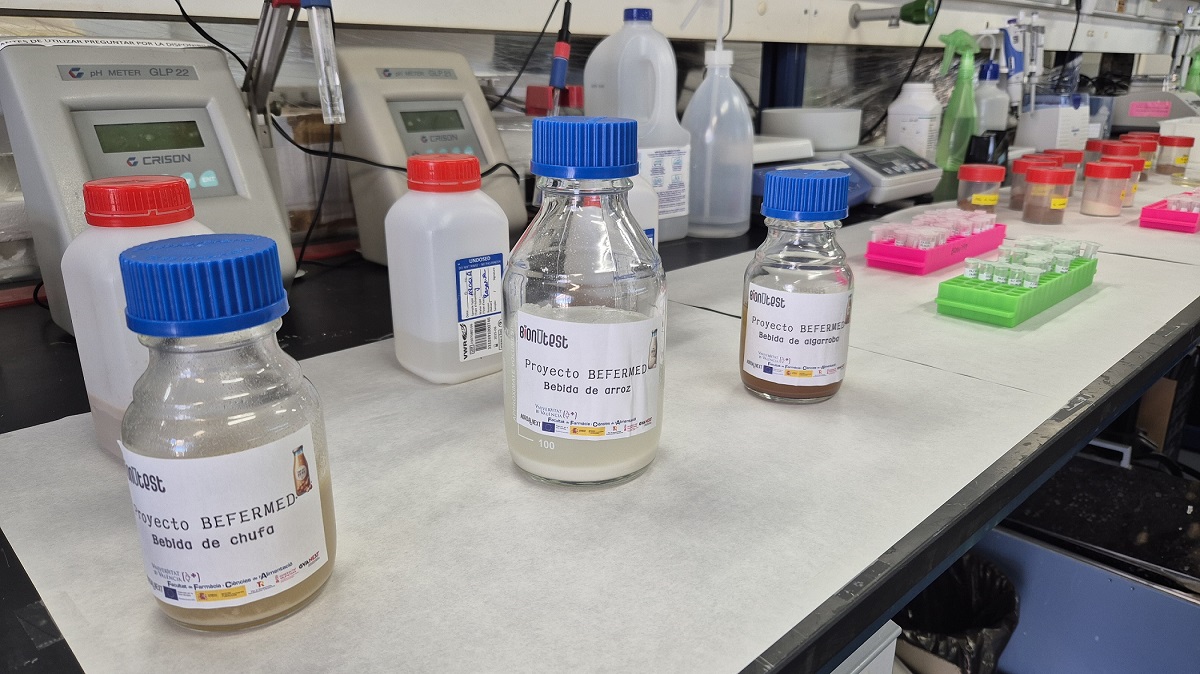
Research staff from the Universitat de València (UV) ha sled the research of a procedure so that through lactic fermentation they can improve the nutritional, functional and sensorial properties of vegetable drinks elaborated from proximity raw materials such as rice, tiger nut and carob seed. The project, published in the magazine ‘Foods’ and in which the Spanish Research Council (CSIC) collaborates, develops more healthy and sustainable food alternatives for lactose-intolerant or allergic to milk protein people.
“The fermentation process has been optimised using four commercial cultivations of lactic bacteria and the antioxidant and probiotic capacity, the profile of bioactive compounds, the nutritional composition and the scent of the resulting drinks, has been evaluated. The carob seed drink presents the biggest quantity of polyphenols (of vegetal origin compounds with potent antioxidant proprieties), followed by the tiger nut and the rice ones”, explain Mónica Gandía and Guadalupe García Llatas, professors and researchers from the Grupo Bionutest from the Faculty of Pharmacy and Food Science of the UV.
Among conclusions on the work in which CEBAS-CSIC also participates, located in Murcia, it has been concluded that the bacterial consortium VEGE061 is the most effective in improving parameters such as the profile of fatty acids and the scent quality, specially in the tiger nut drink (with lactic and floral notes) and the carob seeds drink (with a balanced scent).
As Amparo Gamero and Antonio Cilla, main researchers of the project, “in the context of the project BEFERMED in which this work is framed, it has also been observed that, after the simulated gastrointestinal digestion, drinks keep good sensorial characteristics and functional potential. However, the published results show that the survival of probiotics is significantly reduced, specially in the tiger nut and carob seeds drinks. Therefore, an implantation of additional strategies that ensure the viability of microorganisms is required”.
Among the news of the research, not only the fermentation process has been optimised for each drink, but also factors such as antioxidant capacity, profile of bioactive compounds, nutritional composition, profile of fatty acids, probiotic viability after simulated gastrointestinal digestion or the scent characteristics of the resulting drinks, have been evaluated.
“The BEFERMED project also compares how the digestive process and the vegetal matrix can influence in the profile of antioxidant phytochemical compounds after the fermentation and survival of probiotics, something not very addressed in previous and crucial researches when taking into account that possible potential”, explains Matteo Vitali, predoctoral student from the Grupo Bionutest and first signer of the article. The research also promotes the innovation of vegetal fermented products that can be consumed by lactose-intolerant or allergic to milk protein people and provides knowledge for the transparency of the industrial sector research, fact that makes the development of new functional food adapted to current tendencies easier.
Sustainable Development Goals (ODS)
This research is related to many Sustainable Development Goals (ODS) such as number 3 (Health and well-being), as it optimises the development of vegetable drinks with a potential healthy effect; the ODS 12 (Responsible production and consumption) and the ODS 13 (Climate action) when proposing the use of vegetable raw materials coming from local products. Furthermore, it is developed in a population growth, climate change and greater scarcity of resources context.
This study is part of the BEFERMED project inside the AGROALNEXT (AGROALNEXT/2022/047) programme with the support of the Ministry of Science, Innovation and Universities and the funding of the EU NextGeneration EU (PRTR-C17.I1) and the Government of the Valencian Community.
Scientific article reference: Vitali, M., Gandía, M., Garcia-Llatas, G., González-Sarrías, A., Vallejo, F., Cilla, A., & Gamero, A. (2025). Modulation of Antioxidant Capacity, Nutritional Composition, Probiotic Viability After Digestion and Sensory Attributes of Plant-Based Beverages Through Lactic Acid Fermentation. Foods, 14(9), 1447. https://doi.org/10.3390/foods14091447
Appendix caption:
- Sample of the tiger nut, rice and carob seeds fermented drinks that have been elaborated and evaluated in the BEFERMED (AGROALNEXT/2022/047) project of the AGROALNEXT_GVA call.
- Research team of CEBAS-CSIC that has collaborated in the study. From left to right: Fernando Vallejo (Metabolomic Service) and Antonio González-Sarrías (Group on Quality, Safety and Bioactivity of Plant Foods).
Images:
.jpg)












